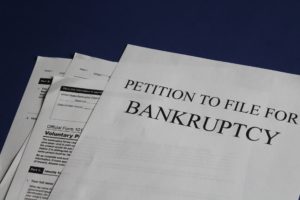Debt settlement and bankruptcy are two options for financially distressed consumers who are drowning in debt. If you’re considering either, you’ve likely explored home equity loan products, debt consolidation, and credit counseling but haven’t had much luck.
Or maybe you tried picking up a side gig to get a handle on your debt. Still, the minimum monthly payments were too overwhelming to get a handle on.
Before you enroll in a debt settlement program or file bankruptcy, it’s essential to understand what each entails. Doing your research will help you make an informed decision.
What is Debt Settlement?
You can work with creditors to settle your debts or hire a company to do the legwork for you. Either way, the end goal is to negotiate a settlement offer that allows you to pay a fraction of what you owe to satisfy outstanding debt balances.
Debt settlement only works for unsecured debts, including credit card debt, personal loan debt, payday loan debt, private student loans, and medical debt. Debts secured by collateral, like home and auto loans, are not eligible for inclusion in debt settlement programs. Federal student loans, tax debt, and debts related to lawsuits also don’t qualify.
If you have a sizable amount of cash, you can take the DIY approach. Be mindful that the creditor will typically expect payment shortly after they agree to your settlement offer. But if money is low, it may be best to hire a debt settlement company to negotiate on your behalf.
Most consumers who enroll in debt settlement programs stop making payments to creditors to speed up the process. Instead, they make monthly contributions to a dedicated account. The funds are used to pay creditors as settlement agreements are reached.
Advantages of Debt Settlement:
Here are some benefits of debt settlement programs:
- You could resolve your debts in as little as 24 to 48 months.
- You could save a bundle in interest.
- You could avoid bankruptcy.
- You won’t have to pay massive fees upfront.
- You only pay when the debt is settled (and the funds are taken from your dedicated savings account).
Disadvantages to Debt Settlement:
Unfortunately, there are drawbacks to consider:
- There are no guarantees that creditors will accept settlement offers.
- Your credit score could take a hit.
- You could get sued by creditors.
- You could owe taxes on the portion of the debt that’s forgiven (if it’s over $600).
- You’ll pay between 15 and 25 percent of the settlement amount.
What is Bankruptcy?
There are two types of personal bankruptcy – Chapter 7 (Liquidation of Assets) and Chapter 13 (Reorganization).
If you file for Chapter 7 bankruptcy, the courts will require the following:
- Bankruptcy petition
- Statement of financial affairs
- Financial records (including pay stubs, bank statements, loan documents, and credit card statements)
- Any other documents requested by the court
A judge will review your documents, and if approved, your assets will be sold to a trust appointed by the court. The proceeds will then be distributed to your creditors who have filed claims against you in a court of law. Furthermore, you will no longer owe the debts covered under your bankruptcy.
By contrast, Chapter 13 does not give you a clean slate. Instead, you make monthly payments to a court-appointed trustee for three to five years. The court decides how much is distributed to creditors each month.
Some of your debts may not be paid in full at the end of the repayment term. Consequently, any remaining balances for debts covered under the bankruptcy will be forgiven, and you won’t be on the hook for federal income tax.
Advantages and Disadvantages of Chapter 13 Bankruptcy
Advantages of Chapter 13 Bankruptcy:
Chapter 13 offers the following benefits:
- Your creditors can’t come after you for the remaining balances once you complete the repayment plan.
- You could get lower debt payments.
- You’ll have three to five years to get caught up on past-due alimony, child support, and income tax.
- Your cosigners (on personal loans) will be protected.
- Your creditors may be open to negotiations on loan terms.
Disadvantages to Chapter 13 Bankruptcy:
You should also consider these drawbacks:
- The plan takes three to five years to complete.
- Your credit cards will be closed.
- Your credit score will be damaged.
- You won’t have much (if any) disposable income during the repayment term.
- Student loan debt is not eligible for inclusion.
Advantages and Disadvantages of Chapter 7 Bankruptcy
Advantages of Chapter 7 Bankruptcy:
Here are a few key benefits:
- The entire process can be completed in just three to six months.
- Collection activity must cease.
- Debts included in bankruptcy filings will be wiped clean.
- You won’t be subject to wage garnishment.
- You may be able to stop your home from being foreclosed.
Disadvantages to Chapter 7 Bankruptcy:
Some significant drawbacks to consider:
- Your filing will be public knowledge to your debtors (including creditors, friends, and relatives).
- You may not qualify if your income is too high.
- You could lose valuable assets.
- Student loans are not eligible for inclusion.
- Your credit score will take a hit (and the bankruptcy filing will stay on your credit report for 10 years).
Debt Settlement vs. Bankruptcy: Which is Better?
Both options could help you get relief from qualifying debts, but there will be negative consequences for your credit health. Here’s how to determine which option may be best for your financial situation.
When to Consider Debt Settlement
If your debt has spiraled out of control and you don’t qualify for bankruptcy, debt settlement may be the better option. You should have the ability to make monthly payments to the dedicated account for this method to be effective.
When to Consider Chapter 13 Bankruptcy
Chapter 13 may be best if you have assets you’d like to keep while going through bankruptcy. You should also meet the income requirements and be able to make monthly payments per the court-mandated repayment plan.
When to Consider Chapter 7 Bankruptcy
Chapter 7 could work for individuals with minimal income (that meets the Chapter 7 bankruptcy income limit) or assets but carry excessive credit cards, personal loans, and medical debt.
Can You File Bankruptcy If You Are In A Debt Settlement Program?
Your enrollment in a debt settlement program will not affect your ability to file for bankruptcy.







